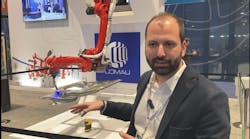Jim Montague is the executive editor for Control. Email him at [email protected].
Stop me if you've heard this hallucination before. Oops, too late. It used to be that when I interviewed folks for a half dozen different articles, they would generally talk about different things. Motor experts would talk about motors and drives. Controls engineers would talk about PLCs. Software sources would talk about programming. Salespeople and CEOs would talk about nothing, I mean, excitement and synergy.
Sure, there was some talk about porous borders between the usual technological silos, breaking down a few barriers, and some topical overlap as a result. Still, most subjects retained their basic shape, and remained mostly distinct from each other. Not anymore.
The amount of technical overlap of control and automation topics is getting to the point where there is only overlap and little else. Each topic fits sloppily or neatly on top of the others like a stack of blasted pancakes!
In the past few weeks, for example, I've interviewed several dozen sources on network security, green and sustainable technology, recorders and data acquisition (DAQ) systems, motor technologies, machine safety, network integration and several others. However, as I asked my questions, I noticed that most of the people I interviewed were going off on tangents and speaking about the other topics I was covering, and not the one that I planned to discuss with them. Now, some asides and departures are normal in most interviews, but the sheer ratio was huge, and it's been increasing lately. Amazingly, almost everyone I was talking to was speaking about every other story except the one I asked about.
It's sort of like every control and automation story is merging into one big story. It's been surreal and unnerving, but it also can be pretty annoying when you're trying to report and write several different stories.
This latest experience also is a lot like my previous efforts to cover industrial computers, which now seem able to take on any form and almost any function. It also was similar to researching recorders and DAQ systems, whose data gathering, archiving and analyzing functions seem able to be done by almost any data processing module or chip. The question is: If anything can do these jobs, then how do I define them and make them distinct enough to write about them?
This time around, it seems like everyone is joining in the integration square dance. The security folks talk about safety, while the safety experts talk security. Several green sources describe the need for motor efficiency and the need to use variable speed drives (VSDs) to aid sustainability efforts. Meanwhile, the motors guys show how more pervasive networking and intelligence can improve efficiency beyond individual motors. Get the idea?
The only common thread was networking. Of course, everybody and their brothers are using Ethernet in some way, but even the networking folks can't quite stay on topic. Just check out this issue's "Search for a Single Spine" cover story (p10). They begin talking about fieldbuses, cables and wireless, but they too lapse into something else, such as I/O points, sensors and even motors and drives. From where I'm sitting, it's like everybody is looking over everyone else's shoulder, and they're doing it all at the same time.
I suppose this should come as no surprise. Now that many networking translation functions are being handled by switches, gateways, programming and other devices both hard and soft, process engineers, system integrators, machine builders and end users can get back to the applications in which they're truly interested.
Consequently, as spooky as it can be to watch formerly separate topics mash together, it's actually good news for control and automation engineers, if they can overcome a little more technological and organizational upheaval. And given the number of engineers using tablet PCs, overachieving handhelds, Blackberry devices and cell phones on or near plant floors, it seems most won't have much trouble adapting.
So, are there any new lessons here? Just more of the same—get ready for ongoing job description changes. Added exploration and education in new technologies won't be a novelty or a hobby. Looking over other technical shoulders will be a core and expected necessity as networks continue to merge with their applications and users. I just hope I don't run out of stories to write.






